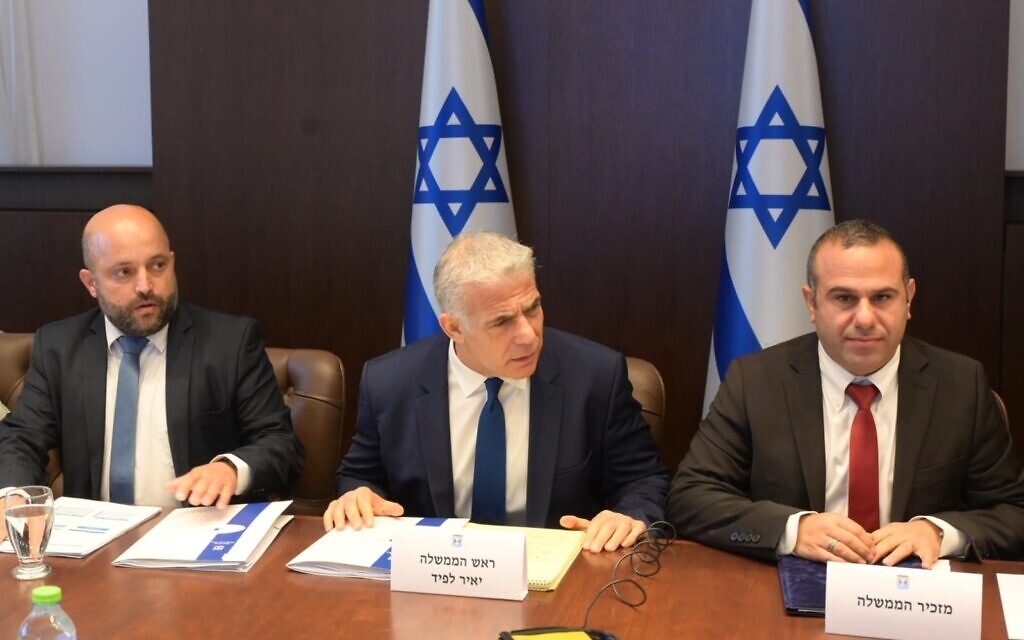Israel’s maritime boundary agreement with Lebanon, approved by both sides on October 11 and ratified by the Israeli security and full cabinet on the following day, is expected to stabilize relations between warring neighbors.
“This is a historic achievement that will strengthen Israel’s security, bring billions into Israel’s economy, and ensure stability on the northern border,” said Israeli Prime Minister Yair Lapid after all the ministers, except Interior Minister Ayelet Shaked and Communication Minister Yoaz Hendel, voted to support it.
Lebanese President Michel Aoun also expressed satisfaction, saying it meets Lebanon’s “demands and preserves its rights to its natural resources.”
U.S. President Joe Biden, the sponsor of the agreement, described it as “a historic breakthrough” that will set “the stage for a more stable and prosperous region.”
Brokered by U.S. diplomat Amos Hochstein after more than a year of mediation, and guaranteed by the United States, it demarcates exclusive economic zones in the eastern Mediterranean Sea, offers financially broke Lebanon a golden opportunity to eventually extricate itself from its grave economic crisis, and defuses the threat of an armed clash between Israel and Hezbollah.
Under the broad terms of the landmark accord, which hit a road block several days ago and suddenly seemed in jeopardy, Lebanon recognizes the Israeli claim to the Karish natural gas field, which is being developed by Energean, a Greek-British company.

In return, Israel recognizes the adjoining Qana reservoir as Lebanese, even though part if it lies within Israel’s border. In exchange for this concession, Israel will receive 17 percent of the revenues from Qana, whose development will be managed by French and Italian companies.
Drilling in Karish is due to begin soon, but years may elapse before gas can be extracted from Qana. Still, as the American Task Force on Lebanon, noted, “The agreement brings hope to the Lebanese people, who have suffered through … economic despair and upheaval.”
European countries, eager to find alternatives to Russian gas supplies since Russia’s invasion of Ukraine last February, will be pleased to buy gas from the Israeli and Lebanese sites.

This is not an agreement between Israel and Lebanon — which have been in a technical state of war since Israel’s creation in 1948 — but rather separate but related agreements between Israel and the United States and Lebanon and the United States.
Lebanon preferred this approach because it is far from politically or psychologically ready to normalize relations with Israel due in large part to Hezbollah’s opposition.
The text of the agreement states that the maritime agreement border will be concluded “without prejudice to the status of the land boundary.” This means that Israel’s northern land border has yet to be officially recognized by Lebanon.
Last month, the director of Israeli military intelligence, General Aharon Haliva, said that Lebanon would have already established normal diplomatic relations with Israel had it not been taken “hostage” by Hezbollah, whose leader, Hassan Nasrallah, has praised the agreement as a win for Lebanon.

In years past, the consensus among experts and pundits was that Lebanon would be the second country to make peace with Israel. But this notion vanished into thin air after Israel’s peace agreements with Egypt and Jordan in 1979 and 1995.
In 2020, Israel normalized relations with the United Arab Emirates, Bahrain, Morocco and Sudan within the framework of the Abraham accords, which clicked into place during the presidency of Donald Trump.
Israel’s relations with Lebanon, which were relatively peaceful after 1948, deteriorated markedly in the wake of the 1967 Six Day War.
The Palestine Liberation Organization, headed by Yasser Arafat, established a web of military bases in southern Lebanon from which it attacked Israel. These attacks led to Israeli retaliatory raids from 1968 onwards and Israel’s massive invasion and occupation of southern Lebanon in 1982.
A new and deadlier phase of Israel’s presence in Lebanon began shortly afterward. Hezbollah, a Shi’a militia supported, trained and financed by Iran, emerged after the 1982 war. From then until Israel’s unilateral withdrawal from Lebanon in 2000, the Israeli army and Hezbollah were embroiled a fierce guerrilla war. In 2006, Israel’s and Hezbollah fought a month-long war.
Since then, Israel and Hezbollah have clashed periodically.
Until very recently, in the absence of an Israeli agreement with Lebanon, Hezbollah threatened to disrupt drilling at Israel’s Karish field. Had this scenario unfolded, Israel would have reacted harshly, and a third war in Lebanon may well have erupted.

Hochstein’s behind-the-scenes mediation efforts, aided by France, averted the possibility of war and yielded an agreement that will now be reviewed by the Knesset over a period of up to two weeks.
Yesterday, Israel’s Supreme Court rejected a request by a lobbying group to issue an injunction against the agreement, while Attorney-General Gali Baharav-Miara ruled that the government has the legal right to sign it, notwithstanding the forthcoming general election on November 1.

The opposition leader, Benjamin Netanyahu, continued to denigrate the agreement. “This is not a historic deal, this is a historic surrender,” he said. “A liquidation sale by Lapid.”
He added, “For over a decade, the government I led did not bow to Nasrallah’s threats, and we did not have war. And then came Lapid. Within three months Lapid surrendered fully to all Hezbollah demands.”
Blasting Netanyahu, Lapid asserted that the agreement reinforces Israel’s security, “staves off” war with Hezbollah, and has the potential to “reduce Iran’s influence” in Lebanon.

Lapid’s national security advisor, Eyal Hulata, said it “does not support Iran’s interests in Lebanon,” but instead “strengthens the Lebanese government independently, and reduces its dependence on Hezbollah.”

Lapid accused Netanyahu of spreading “false and toxic propaganda” about it, claiming his criticism was rooted in partisan politics.
The U.S. ambassador to Israel, Tom Nides, dismissed Netanyahu’s comments as “ridiculous,” pointing out that Netanyahu supported a “very similar” agreement when he was prime minister.
Netanyahu, hoping to regain the premiership after losing it last year, is attempting to undermine the agreement for selfish political purposes.
